- Home
- Philip Roth
Letting Go Page 2
Letting Go Read online
Page 2
“It knocked Isabel over,” I said.
She received the remark blankly. “Yes,” she said.
I tried to remember where in the book the letter was stuck. “How far have you read?” I asked.
“Up to where she meets Osmond. I think I can see what’s coming. Though,” she rushed to add, “perhaps I can’t. I really shouldn’t say that.”
“You must … you must have read all night,” was all I finally said.
She flushed again. “Almost,” she told me. “Paul hasn’t started the book yet—” I was looking ahead at the road; I heard her voice stop, and then I felt her move a little toward me. I believe she touched my arm. “Mr. Wallach, there was a letter in your book.”
“Was there?”
“You must have forgotten it.”
The quality of her voice had altered so as to make the whole occasion much too momentous; I heard myself saying that I didn’t remember any letter.
“I brought it with me,” she said, and from the pocket of her shabby raincoat she took the envelope; it must have been this she had raced back into her bedroom to fetch while I had waited at the doorstep. Now she handed it to me. “It was in the book.”
“Thank you.” I put the letter immediately into my own jacket pocket. Out of sight I fumbled with it, but there was no evidence either way—the flap was tucked in. Nevertheless, I drove ahead with only one hand on the wheel. Mrs. Herz pulled at her black stockings, then stuck a fist under each knee. For two miles neither of us said anything.
In the tone of one musing she finally spoke. “She marries and is miserable.”
I had been musing myself, and so I misunderstood at first who exactly was the subject of her observation. My misunderstanding must have produced a very strange expression on my face, for when I turned to demand an explanation, Libby Herz seemed nearly to dissolve in her seat. “Isabel will marry Osmond,” she said, “and be miserable. She’s—she’s a romantic … isn’t she?” she asked shakily.
I had not meant to threaten her. I forgot my family as rapidly as I could, and tried hard to be graceful. “I guess so,” I said. “She likes rugs on lawns.”
“She likes rugs on lawns,” Mrs. Herz said, grinning. “That’s the least of it. She wants to put rugs on other peoples’ lawns.”
“Osmond?”
“Osmond—and more than Osmond.” She raised her hands and opened them, slowly and expressively. “Everything,” she said, drawing the word out. “She wants to alter what can’t be altered.”
“She believes in change.”
“Change? My God!” She put her hand to her forehead.
It was the first time I was amused by her. “You don’t believe in change?”
Without warning she turned momentous on me again. “I suppose I do.” She stared a little tragically into her college girl’s raincoat: change, alteration, was not so much the condition of all life as it was some sad and private principle of her own. The hands tugged again at the stockings, went under the knees, and she withdrew. I drove faster and hunted the highway for Paul Herz.
“Well, do you believe,” Mrs. Herz suddenly put in, “in altering that way? Isabel’s trouble is she wants to change others, but a man comes along who can alter her, Warburton or what’s his name, Ramrod—”
“Goodwood. Caspar Goodwood.”
“Caspar Goodwood—and what happens? She gets the shakes, she gets scared. She’s practically frigid, at least that’s what it looks like a case of to me. She’s not much different finally from her friend, that newspaper lady. She’s one of those powerful women, one of those pushers-around of men—”
Before she went off the deep end, I interrupted and said, “I’ve always found her virtuous and charming.”
“Charming?” Incredulity rendered her helpless. Slumping down in her seat, as though konked on the head, she said, “For marrying Osmond?”
“For liking rugs on lawns,” I said.
It was as though I had touched her. She pushed up into a dignified posture and raised her chin. Actually I had only mildly been trying to charm her—and with the truth no less; but in the diminished light, alone on the highway, it had had for her all the earmarks of a pass. And perhaps, after all, that’s what it was; I remembered the seriousness with which we had looked at each other some ten miles back.
To inform me of the depths of her loyalty to her husband, she insulted me. “Perhaps you just like pushy women. Some men do.” I didn’t answer, which did not stop her. Since I had asked for the truth, I was going to get all of it. “That book, as a matter of fact, is really full of people pushing and pulling at each other, and most often with absolutely clear—”
She had been speaking passionately, and leaving off there was leaving off entirely too late. There was no need for her to speak that final word of my mother’s: conscience. I was not sure whether to be offended or humiliated or relieved; for a moment I managed to be all three. It actually seemed as though she had deliberately challenged me with my secret—and at bottom I did not know if I really minded. The worst part of certain secrets is their secrecy. There is a comfort to be derived from letting strangers in on our troubles, especially, if one is a man, strangers who happen also to be women. Perhaps offering the book to be read in the first place had been my way of offering the letter to be read as well. For I was beginning really to be exhausted with standing over my mother’s memory, making sure the light didn’t go out. I had never even been willing to believe that my mother had treated my father badly, until she had gone ahead and told me so. Much as I loved him, he had seemed to me, while she still lived, unworthy of her; it was her letter that had made me see her as unworthy of him. And that is a strange thing to have happen to you—to feel yourself, after death, turning on a person you have always cherished. I had come to feel it was true that she had not merely handled him all her life, as one had to, but that she had mishandled him … At least I believed this with part of my mind. I had, curiously, over a period of a year, come to distrust the woman of whom the letter spoke, all the while I continued to honor and admire the memory of the woman who could have written it. And now, when I had begun to have to handle her husband myself, the letter came accidentally back into my life, to decrease in no way my confusion as to what to do with my father’s overwhelming love.
“I’m sorry,” Libby Herz was saying. “It was habit. Which makes it even worse. I am sorry.”
“It’s okay.”
“It’s not. I had to open it. I’m the sort of person who does that.”
Now I was irritated at the way she seemed to be glorifying herself by way of her weaknesses. “Other people do it too,” I said.
“Paul doesn’t.” And that fact seemed to depress her most of all; she worried it while we passed a tall white farmhouse with gingerbread ornament hanging from the frame of every window and door.
After some time had passed, I felt it necessary to caution her. “It’s rather an easy letter to misunderstand,” I said.
“I suppose so, yes,” she answered, in a whisper. “I don’t think—” But she said no more. Her disturbance was private and deep, and I could not help but feel that she was behaving terribly. If she was going to feel so bad about somebody’s feelings, I believed they should at least have been mine. But she seemed unable to work up sympathy for anyone but herself: she was still getting her B.A., after “a decade”; she lived in barracks, so that elegance had a special poignancy for her … Her own condition occupied her totally, and I knew that she could no more appreciate my mother’s dilemma than she could Isabel Archer’s. I was, at last, fed up with her. “Portrait of a Lady” I said, “is an easy book to misunderstand too. You’re too harsh with Isabel Archer.”
“I only meant—”
“Why don’t you wait until you read it all.”
“I read half—”
“She shows herself to have a lot of guts in the end,” I said, again not allowing her to finish. “It’s one thing marrying the wrong person for the wrong reasons
; it’s another sticking it out with them.”
To that she had no answer; I had not really permitted one, and perhaps she realized that I was not talking only about the book.
Crushed, she answered finally, “I didn’t mean to be so flip. Or nosey.”
“All right, let’s forget it.” Though I was myself unable to. “I don’t usually leave letters in books,” I said. “It was a peculiar time. I was in the Army—” I heard myself becoming, in front of this girl, as momentous about my life as she had been about her own, and I stopped talking.
“Mr. Wallach,” she said, “I didn’t show it to Paul, if that alleviates anything.”
“We’re making much too much of this. Let’s do forget it.”
The next time she spoke it was only to point up ahead and say, “There he is.”
On the other side of the highway a figure in a long coat was leaning against the darkened headlamp of a car. I moved onto the shoulder at the right-hand side of the road just as Libby took my arm.
“Please forgive me. I’m a snoop, and I’m dumb about novels,” she said. “About people.”
It was supposed to have been a genuine admission, but once made I realized that it was not true; she was not so dumb finally about either.
“I’m sure you’re right about everything,” she said to me.
“Maybe we’re both right,” I answered, though not overgenerously, and turned off the motor and headlights.
Before she reached for the door handle, she turned her face toward me once again. When people have much to say to you, and hardly any time in which to say it, their eyes are sometimes like Libby Herz’s were that moment; above all, they were kind. “Mr. Wallach, I stayed up to read the book because I was very moved by the letter,” and then, as though we were being watched, we both jumped from the car.
All that had to be removed from Paul Herz’s Dodge was a briefcase stuffed with freshman themes, a flashlight, and an old army blanket that had been used to cover the torn upholstery in the front seat. We had to sit for half an hour in my car waiting for the wrecker; Herz had asked a state trooper to call one for him. There was little conversation: Libby discovered that her husband had ripped his new coat, and Herz said that he’d caught it on the hood, and from the back seat I thought I heard his wife begin to sob. Finally the wrecker arrived and the four of us gathered solemnly in the dark around the damaged hood. A sinewy little grease monkey, the wrecker flexed his knuckles and then stuck his hand down through the hole which the flying piston had made in the engine.
“Ten dollars,” he said.
“For repairs?” Libby asked.
“For the car,” the wrecker replied.
Headlights flashed by on the highway, illuminating on Libby Herz’s face astonishment and woe. “Ten dollars! That’s ridiculous. Paul, that’s ridiculous.”
The wrecker addressed the husband. “It’s junk.”
“It’s a ’47,” Libby said feebly.
“Lady, it’s got five pistons. It’s junk.”
“Five?”
“It’s gotta have six to go,” said the wrecker.
“Still.” Then she looked toward her husband. “Paul …”
The wrecker stuck his hand in again, and Libby turned quickly back to him as though perhaps he’d miscounted the first time. He only looked at me and shrugged his shoulders. Herz looked at none of us; I saw him shut his eyes.
“How much would it cost … to fix it?” Libby asked the question generally, as she had to; she was being ignored all around. The wrecker folded his arms and made me once again special witness to his exasperation. The two of us, thank God, were not married to this woman: he gave off a slow hiss for our side.
“We can’t fix it,” Herz said. “Please, Lib.”
“Paul, ten dollars. The parts alone—the heater alone.”
“Lady,” the wrecker said, and he seemed to have summoned his patience for an explanation of engine dynamics. “Lady, it’s junk,” he said.
“Will you stop saying junk!” She was seeing through teary eyes, and talking with a full nose, and she turned her back to all of us and walked off toward the tow truck. Under the thick iron hook that swung off the crane, she stopped and blew her nose; she looked up, whether at the clear moony sky or the iron hook I didn’t know, but one or the other must have made an ungenerous comment to her about her fate, for she shuddered, and holding her arms around her front like a sick woman, climbed into the back seat of my car.
Paul Herz took his hands out of his coat pockets. “She’s upset,” he explained.
I nodded; the wrecker said, “I haven’t got all night.”
Herz looked at him and then, by himself, took a little walk around his car, staring down at each of the tires as though above all else he hated losing those four old friends. When he came back to us he tried to smile at me. “Okay,” he said.
The wrecker took a tight fat wad from his pocket; he flashed it a little at us college boys and peeled off two fives. He rubbed them a moment with his black fingers and handed the cash to Herz.
“Is that all?” Herz said.
The grease monkey was overcome suddenly with cheeriness. He lifted his arms in the air. “That’s all, professor.”
We drove back to Iowa City with Paul Herz sitting alongside me in the front. As soon as we got in the car Herz had said to me, “Thanks for being so patient. I’m sorry about all this.”
“It’s okay.”
“The thief,” Libby Herz said. In the rear-view mirror I saw she was sitting on her knees looking out the back window.
Herz seemed at first to decide not to be provoked, but at last he spoke. “Libby, the car blew a piston. It’s junk.”
“That’s what the man said,” his wife answered.
“Okay,” Herz said.
“Ten dollars … the fenders alone—”
Herz glanced my way to see if I was listening. I tried my best to attend only to the black road, but of course there were my ears to contend with. “Libby,” he said, “will you please? You don’t know anything about cars, honey.”
“I know about thieves.”
“Damn it,” Herz said, turning in his seat, “nobody cheated me!”
“I didn’t say he cheated you—”
“What did you expect me to do? Bargain with him for a couple of dollars in the middle of the highway? I’ve been standing there for over an hour!”
“We’re not millionaires!”
“You don’t know anything about cars. Will you please be quiet!”
“Why did the piston come through like that?” she whined.
Herz turned to the front window again; he was fingering his coat where the cuff was torn. “I don’t know.”
“What are we going to do?”
“I don’t know!”
By this time I was practically hunched behind the wheel, feeling the emotions of an eavesdropper—and having the thoughts of one too. Like most people with an ear to the wall, I had taken a side: the impossible one to live with, I could see now, was clearly the wife. Her husband’s car had been raised on a hook and towed away; his briefcase was splitting with ungraded themes; his new coat, which looked to me to be a pretty old coat, was torn in the sleeve; and to top things off, his Anglo-Saxon verbs, like mine, had been waiting for centuries to be memorized, and waited still. And she wouldn’t let the poor guy alone. Without being too obvious about it, I pushed the accelerator into the floor, though I realized that by outracing Paul Herz’s temper, and avoiding what I could of his familial difficulty, I was of course racing back to familial problems of my own. I would walk through the door, the phone would ring, I would lift it, and my father would say: “Where were you—I’ve been calling all night?” I could race up the stairs and crash through the apartment and catch the phone on the second ring, and he still wouldn’t be satisfied: What’s the matter I wasn’t there for the first? In short, why hadn’t I called him? In short, why had I run off to Iowa for graduate work when Columbia was only two subway
stops north? I could go back to Harvard, couldn’t I? At least it wasn’t six million miles away!
“Can’t you get another section on the campus?” Libby Herz was asking her husband.
“Honey, I’m just not quitting Coe,” Herz explained.
“How are you going to get there?”
“I’ll work it out.”
“Don’t you have a class there tomorrow?”
“Yes.”
“How are you going to get there?”
“Why don’t you wait until we get home, all right?”
Small sounds of brooding followed. Someone crossed a limb, someone sniffed, someone tapped for several minutes against an ash tray. I felt pressed to say something, and finally, innocuously, asked Herz if he taught at Coe College.
“That’s where I was coming from.” He seemed almost relieved to answer my question. “I teach two sections of composition.”
“I thought you taught on the campus,” I said.
“Just one section.”
“I don’t understand,” Libby butted in, leaning forward from the back seat, “how a piston just explodes. Out of nowhere.”
No one answered her.
“Wasn’t there enough oil? It was probably the what-do-you-call-its,” she said, “the tappets. Didn’t the man say something once about tappets?”
It’s the little questions from women about tappets that finally push men over the edge. Herz practically rose in his seat. “Libby, what do you think has been knocking in the engine since Michigan? A piston has been cracking or whatever the hell it’s been doing for two years. Since Detroit. Why don’t you consider us lucky—we’ve driven that car thousands of miles. Stop thinking of the bad—think of all the use we got out of it. Let’s not worry about the car. I sold it. We don’t have it. Forget it!”

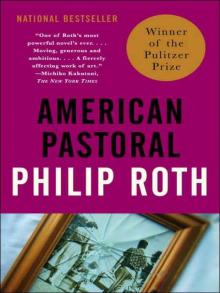 American Pastoral
American Pastoral The plot against America
The plot against America The Human Stain
The Human Stain Nemesis n-4
Nemesis n-4 Sabbath’s Theater
Sabbath’s Theater The Professor of Desire
The Professor of Desire Our Gang
Our Gang The Breast
The Breast Operation Shylock
Operation Shylock The Dying Animal
The Dying Animal Letting Go
Letting Go The Counterlife
The Counterlife Everyman
Everyman Nemesis
Nemesis Exit Ghost
Exit Ghost Portnoy's Complaint
Portnoy's Complaint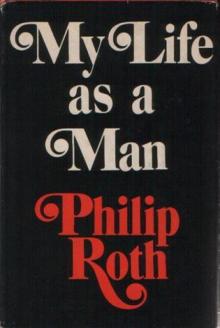 My Life as a Man
My Life as a Man I Married a Communist
I Married a Communist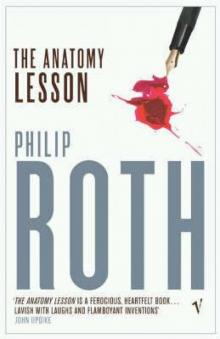 The Anatomy Lesson
The Anatomy Lesson The Great American Novel
The Great American Novel Shop Talk
Shop Talk The Humbling
The Humbling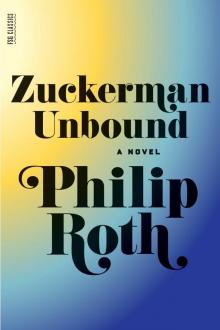 Zuckerman Unbound
Zuckerman Unbound When She Was Good
When She Was Good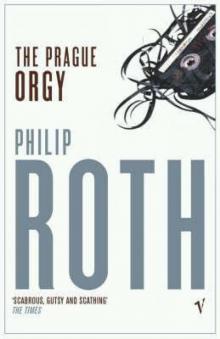 The Prague Orgy
The Prague Orgy American Pastoral (Nathan Zuckerman)
American Pastoral (Nathan Zuckerman) Goodbye, Columbus
Goodbye, Columbus Reading Myself and Others
Reading Myself and Others